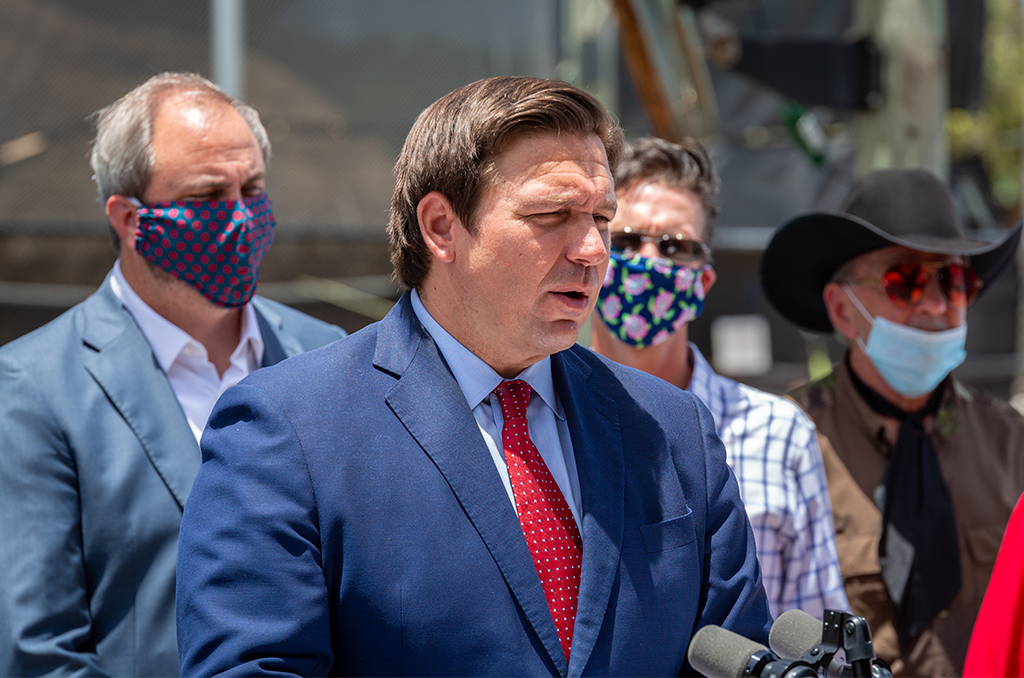Florida Governor Ron DeSantis – Courtesy: Shutterstock – Image by YES Market Media
“We are here to help,” Florida Governor Ron DeSantis is making clear to the incoming Trump administration.
DeSantis convened a special session of his state’s legislature on Monday in part to enact a comprehensive immigration measure that will try to comply with executive orders that Donald Trump is anticipated to sign soon after taking office on January 20.
DeSantis claimed to have directly discussed the policy ideas with the president-elect and to have briefed him and his staff on some of Trump’s initial immigration-related initiatives.
One week following Trump’s inauguration, DeSantis has scheduled the special session for the week of January 27. This gives state lawmakers more time to create policy amendments that support the immigration policies of the Trump administration.
DeSantis informed reporters, “We will modify our actions to reflect their intended policies.”
For the first day of his presidency, Trump’s transition team has been drafting a number of executive orders. Although they are anticipated to cover a wide range of topics, immigration, one of his main campaign concerns, will almost surely receive a lot of attention.
In November, a Trump campaign insider told NBC News that it would be “like nothing you’ve seen in history.”
Trump has publicly concentrated on the idea of mass deportations and abolishing birthright citizenship, but he has not yet specified the precise changes he will seek by executive order—many of which are likely to be challenged in court.
Generally speaking, DeSantis refrained from going into depth about the kind of information his staff has received from the new administration. He did, however, state that he expects Trump will extend the so-called 287(g) program, which permits U.S. Immigration and Customs Enforcement to provide power to local officials to carry out some tasks that are typically performed by federal immigration officials.
“I believe that the Trump administration will implement 287(g) in a more comprehensive manner than we have likely seen,” DeSantis stated. That will be beneficial. Something that will, in my opinion, have a significant impact.
State and local governments can now “opt in” to the program, but DeSantis believes that the Republican-controlled Florida Legislature will use his special session to impose mandatory participation. Trump’s executive directives would be issued before any final linguistic decisions are made.
“We will state that municipalities and sheriffs will be included in 287(g),” he stated.
DeSantis said he wants lawmakers to concentrate on enhancing the ability to punish local officials who violate federal immigration law, increasing the capacity of local law enforcement to enforce immigration policy, and eliminating any remaining “lingering incentives” that allow undocumented immigrants to enter and remain in Florida. The Florida Legislature, which would be in charge of drafting any specific legislation, has not yet submitted any proposals.
DeSantis specifically criticized a 2014 law that grants undocumented immigrants in-state tuition rates. Rick Scott, a Republican who was the state’s governor at the time and is currently a U.S. senator, signed the bill into law, and DeSantis’ own lieutenant governor, Jeanette M. Nuñez, supported it.
According to him, “in-state tuition is a benefit that you are rewarding someone for being here illegally.”
Republicans in Florida have rejected recent attempts to repeal the program through legislation.
In the special session, state Representative Randy Fine, a Trump-endorsed candidate seeking to succeed Rep. Mike Waltz, whom Trump has appointed as his national security adviser, announced that he will once more submit legislation aimed at eliminating in-state tuition for undocumented students, which costs the state $45 million a year.
Fine, who supported Trump over DeSantis in the 2024 Republican presidential primary, stated, “Governor DeSantis and I have had our differences, but one thing we have both wanted to do for years is end the $45 million in handouts for illegal immigrants that attend our world-renowned colleges and universities.”
DeSantis’ request for a comprehensive immigration law was supported by Florida Attorney General Ashley Moody, who is thought to be the front-runner to fill the Senate vacancy left by Marco Rubio, who is being nominated to be Trump’s secretary of state.
She wrote on X, “Thank you @GovRonDeSantis for making sure the state is ready to implement @RealDonaldTrump’s immigration priorities on DAY ONE.”
DeSantis has stated that the candidate he chooses to fill Rubio’s seat will be a hard-liner on reforming the so-called H-1B visa program, which has become a contentious issue among Trump supporters since his election victory, but he has not made this announcement publicly.
In contrast to the more populist, anti-immigration segment of Trump’s base, which is led by conservative pundits like Steve Bannon and Laura Loomer, prominent supporters like billionaire tech tycoon Elon Musk have stated that they support the program, which many businesses use to attract lower-cost foreign talent.
In late December, following weeks of internal disputes among MAGA supporters, Trump declared that he thought the idea was “great.”
Stories that matter are our priority. At Florida Insider, we make sure that the information we provide our readers is accurate, easy-to-read, and informative. Whether you are interested in business, education, government, history, sports, real estate, nature or travel: we have something for everyone. Follow along for the best stories in the Sunshine State.
Chris began his writing as a hobby while attending Florida Southern College in Lakeland, Florida. Today he and his wife live in the Orlando area with their three children and dog.

